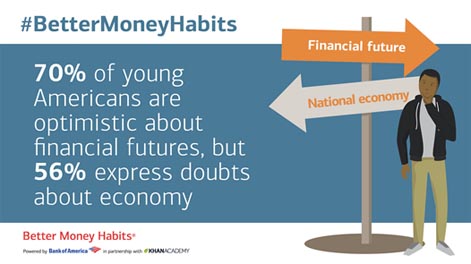| |
 |
| |
Young
adults
in Metro
Detroit
own
homes
and save
more
than
nationwide
peers,
but most
still
don’t
feel
“Life
Ready”
Bank
of
America/USA
TODAY
Better
Money
Habits
Report
Shows
Economic
Issues
Top
Social
Issues
As Young
Voters
Head to
Polls
DETROIT
– A
newly
released
Bank of
America/USA
TODAY
Better
Money
Habits®
report
finds
that for
18- to
26-year-olds
in metro
Detroit,
the
definition
of
adulthood
has
changed:
it is
less
about
age and
more
about
financial
independence.
In fact,
the
majority
(60
percent)
did not
feel
like
adults
when
they
turned
18.
When
asked to
define
adulthood,
this age
group,
which
includes
the
youngest
millennials
as well
as the
oldest
members
of
Generation
Z,
responded
“working
or
having a
full
time
job” as
the top
answer.
Additionally:
•
Roughly
one in
three
(34
percent)
define
adulthood
as
having
achieved
a
financial
milestone
such as
buying a
house or
car,
compared
to
having
achieved
traditional
life
milestones,
such as
getting
married/starting
a family
(8
percent)
or
graduating
from
high
school/college
(7
percent).
• For
those
who feel
like
adults,
the
majority
(62
percent)
say it’s
because
parents
helped
prepare
them.
For
those
who do
not feel
like
adults,
almost
half say
it’s
because
they
still
rely on
their
parents.
In fact,
many
still
rely on
others
to help
with
financial
responsibilities:
only 30
percent
of young
adults
do their
own
taxes
and just
over
half (51
percent)
pay
their
own cell
phone
bills.
At the
same
time, 63
percent
say they
are
setting
aside
money as
savings
and 27
percent
are
contributing
to a
401(k).
Also of
note:
nearly
one in
five (18
percent)
own a
home – a
figure
that is
11
percentage
points
higher
than the
national
average.
“The
fact
that so
many
young
adults
are in a
place
where
they can
buy
homes is
impressive,
and it’s
great to
see that
so many
are
saving,”
said
Carol
Guyton,
market
sales
manager,
Bank of
America.
“This
shows a
degree
of
financial
responsibility
that not
all
young
people
possess.
At the
same
time, it
is
important
that
they
strike
the
right
balances
between
managing
short-term
costs
while
investing
in the
future.”
The need
for
additional
support
and
resources
is what
inspired
Bank of
America
to
partner
with
Khan
Academy
to
create
Better
Money
Habits,
a free
educational
resource
aimed at
empowering
people
to be
more
confident
in their
financial
decision
making.
The site
delivers
easy-to-understand
information
on a
wide
range of
personal
finance
topics
from
retirement
and
taxes to
buying a
home.
Majority
are
cautiously
optimistic
about
their
finances
While
nearly
three-quarters
(73
percent)
of young
adults
in metro
Detroit
feel
somewhat
or very
optimistic
about
their
financial
prospects,
they
cite the
economy
(60
percent)
and job
market
(41
percent)
as poor.
Additionally,
a
majority
(71
percent)
report
being
worried
about
finding
a career
path
that
will
support
the
lifestyle
they’ve
envisioned
for
themselves
– 12
percentage
points
higher
than the
national
average.
Majority
wish
they
learned
more
about
personal
finance
in
school
While
striving
for
financial
independence,
young
adults
in metro
Detroit
say they
did not
learn
enough
about
practical
money
matters
in
school.
Though
their
education
has set
them up
for
success
in other
ways,
young
Detroit-area
residents
are not
necessarily
feeling
“life
ready”
upon
graduating.
Only 40
percent
said
their
high
school
education
did a
good job
teaching
them
strong
financial
habits.
When
asked
what
they
wish
they had
learned
more
about in
school,
nearly
all
named
topics
related
to
personal
finance,
more so
than any
other
life-readiness
skill:
•
Forty-six
percent
wish
they had
learned
how to
do
taxes.
•
Forty-one
percent
wish
they had
learned
how to
invest.
•
Thirty-five
percent
wish
they had
learned
how to
manage
student
loans.
A lack
of
practical
knowledge
has left
some
graduates
feeling
less
than
prepared
for the
road
ahead.
Of those
who
attended
or are
attending
college,
40
percent
had
doubts
about
whether
it
prepared
or is
preparing
them for
the
“real
world.”
Pragmatism
at the
polls:
young
voters
prioritizing
pocketbook
issues
With the
campaigns
in the
home
stretch,
the
report
also
surveyed
young,
first-
and
second-time
voters
in the
Detroit
area.
Contrary
to the
narrative
that
this age
group is
overly
idealistic,
young
voters
in the
area are
actually
quite
pragmatic:
the
majority
(65
percent)
said
that
economic
issues
are more
important
to them
than
social
issues
(34
percent)
in how
they
vote.
Additionally,
79
percent
of those
with
student
debt say
it will
impact
the way
they
vote.
While
concerned
about
their
pocketbooks,
if
forced
to
choose
between
two
candidates
– one
who is
best for
their
personal
finances
and one
who is
best for
the
country
– the
majority
(83
percent)
would
prioritize
what’s
best for
the
country.
|
| |

|
|
|
|
|